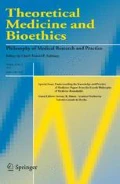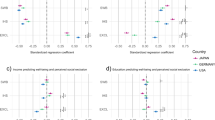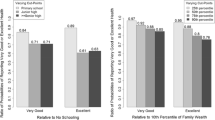Abstract
Persons of low socioeconomic status generallyexperience worse health and shorter lives thantheir better off counterparts. They alsosuffer a greater incidence of adversepsychosocial characteristics, such as lowself-esteem, self-efficacy, and self-masteryand increased cynicism and hostility. Thesepopulation data suggest another category ofharm to persons: diminished moral agency. Chronic socioeconomic deprivation can createenvironments that undermine the development ofself and capacities constitutive to moralagency – i.e., the capacity forself-determination and crafting a life of one'sown. The harm affects not only the choicesa person makes, but the chooser herself. Thismoral harm is particularly salient in modernWestern societies, especially in the UnitedStates, where success and failure is attributedto the individual, with little notice of thelarger social and political realities thatinform an individual's circumstances and choices.
Similar content being viewed by others
REFERENCES
Adler NE, Boyce WT, Chesney MA et al. Socioeconomic inequalities in health: no easy solution. Journal of American Medical Association1993; 269: 3140–3145.
Hertzman C. Early child development in the context of population health. In: Tarlov A, St. Peter RF, eds. The Society and Population Health Reader: A State and Community Perspective. New York: The New Press, 2000.
Pincus T, Esther R, DeWalt DA et al. Social conditions and self-management are more powerful determinants of health than access to care. Annals of Internal Medicine1998; 129(5): 406–411.
Navarro V. Race or class versus race and class: mortality differentials in the US. Lancet1990; 336: 1238–1240.
Williams D. Race, socioeconomic status, and health. The added effects of racism and discrimination. In: Annals of the New York Academy of Sciences. New York: NY: The New Academy of Sciences, 1999; 896: 173–188.
Institute ofMedicine. Unequal Treatment: Confronting Racial and Ethnic Disparities in Health Care. In: Smedley BD, Stith AY, Nelson AR, eds.Washington DC: National Academy Press, 2002.
Sorlie P, Backlund E, Keller J. US mortality by economic, demographic, and social characteristics: the national longitudinal morality study. American Journal of Public Health1995; 85: 949–956.
Wilkinson RG. Unhealthy Societies: The Afflictions of Inequality. London: Routledge, 1996.
Kawachi I, Wilkinson RG, Kennedy BP. Introduction. In: Kawachi I, Kennedy BP, Wilkinson RG, eds. The Society and Population Health Reader: Income Inequality and Health. New York: The New York Press, 1999.
Wilkinson RG. Socio-economic differences in mortality: interpreting the data on their size and trends. In: Wilkinson RG, ed. Class and Health. New York, NY: Tavistock Publications, 1986.
Mechanic D. Rediscovering the social determinants of health. Health Affairs2000; 19: 267–276.
Blane D. Editorial: Social determinants of health - socioeconomic status, social class, and ethnicity. American Journal of Public Health1995; 85: 903–904.
Mackenbach J. Income inequality and population health. British Medical Journal2002; 324: 1–2.
Taylor SE, Repetti RL, Seeman T. Health psychology: what is an unhealthy environment and how does it get under the skin? Annual Review of Psychology1997; 48: 411–447.
Lurie N. What the federal government can do about the nonmedical determinants of health. Health Affairs2002; 21(2): 94–106.
Lantz P, House JS, Lepkowski JM et al. Socioeconomic factors, health behaviors, and mortality. Journal of the American Medical Association1998; 279: 1703–1708.
Lynch JW, Kaplan GA, Salonen JT. Why do poor people behave poorly? Variation in adult health health behaviours and psychosocial characteristics by stages of the socioeconomic lifecourse. Social Science Medicine1997; 44: 809–819.
Scheff TJ, Retzinger SM, Ryan MT. Crime, Violence and self-esteem: review and proposals. In: Mecca AM, Smelser NF, Vasconcellos J, ed. The Social Importance of Self-Esteem. Berkeley: University of California Press, 1989.
Scheff TJ. Microsociology. Chicago/London: University of Chicago Press, 1990.
Goffman E. The Presentation of Self in Everyday Life. New York: Doubleday, 1959.
Levin BW, Schiller NG. Social class and medical decisionmaking: A neglected topic in bioethics. Cambridge Quarterly of Healthcare Ethics1998; 7: 41–56.
Case A, Paxson C. Parental behavior and child health. Health Affairs2002; 21(2): 164–178.
Fonagy P, Higgitt A. Early influences on development and social inequalities: an attachment theory perspective. In: Tarlov A, St. Peter RF, eds. The Society and Population Health Reader: A State and Community Perspective. New York: The New Press, 2000.
Stuber J, Galea S, Ahern J et al. The association between multiple domains of discrimination and self-assessed health: a multilevel analysis of latinos and blacks in four low-income New York City neighborhoods. New York Academy of Medicine, unpublished manuscript.
Kawachi I, Kennedy BP, Lochner K, Prothrow-Stith D. Social capital, income inequality, and mortality. American Journal of Public Health1997; 87: 1491–1498.
Kawachi I, Kennedy BP, Glass R. Social capital and self-rated health: A contextual analysis. American Journal of Public Health1999; 80: 1187–1192.
Faden RR, Beauchamp TL. A History and Theory of Informed Consent. New York/Oxford: Oxford University Press, 1986.
Taylor C. Ethics of Authenticity. Cambridge, Mass: Harvard University Press, 1991.
Beauchamp TL, Childress JF. Principles of Biomedical Ethics, 4th edn. New York/Oxford: Oxford University Press, 1994.
Korsgaard CM, Cohen GA. Equality of what? on welfare, goods, and capabilities. In: Nussbaum MC, Sen A, eds. The Quality of Life. Oxford: Oxford University Press, 1993.
Sennett R, Cobb J. The Hidden Injuries of Class. New York/London: W.W. Norton & Company, 1972.
Steele CM. Thin ice: stereotype threat and black college students. Atlantic Monthly, August 1999: 44–54.
Sen A. Inequality Reexamined. Cambridge: Harvard University Press, 1992.
Taylor C. The Ethics of Authenticity. Cambridge: Harvard University Press, 1991.
Minow M. Not Only for Myself: Identity, Politics, and the Law. New York: The New Press, 1997.
Marchand S, Wikler D, Landesman B. Class, health, and justice. The Millbank Quarterly1998; 76(3): 449–467.
Author information
Authors and Affiliations
Rights and permissions
About this article
Cite this article
Blacksher, E. On Being Poor and Feeling Poor: Low Socioeconomic Status and the Moral Self. Theor Med Bioeth 23, 455–470 (2002). https://doi.org/10.1023/A:1021381616824
Issue Date:
DOI: https://doi.org/10.1023/A:1021381616824




